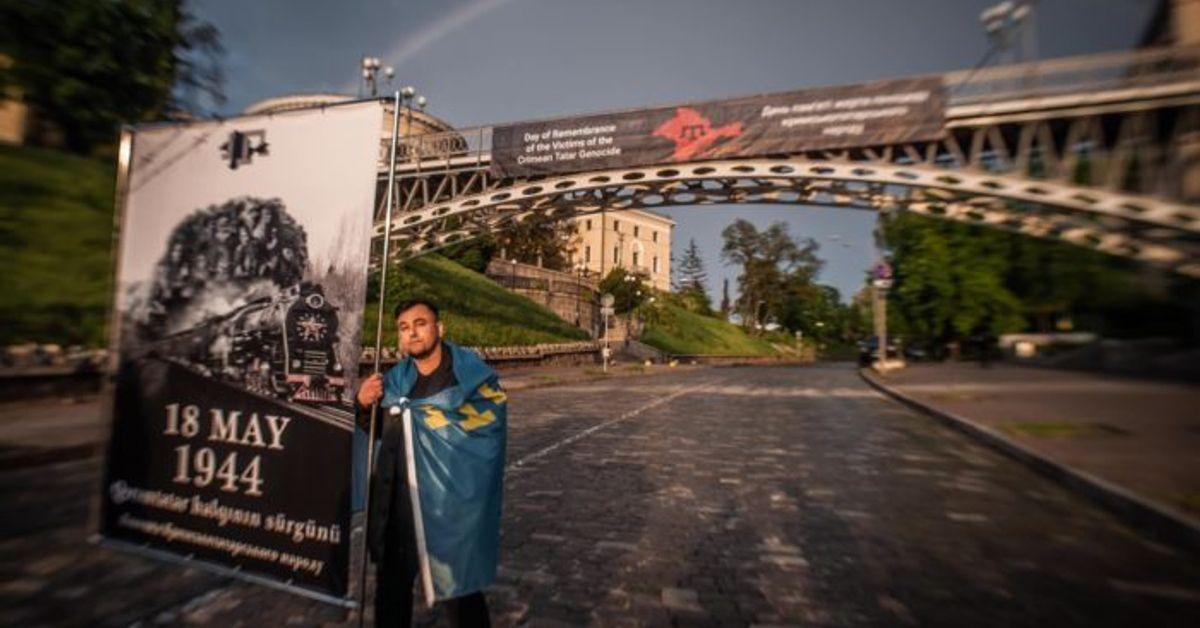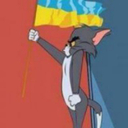Euromaidan Press
News and Opinion from Ukraine and Europe on Military and Political Developments.
Time for world to recognize Stalin’s deportation of Crimean Tatars as genocide – activist.

[editorial]”You cannot forgive the tyrants of the past so that they do not come to life in the present.” Crimean Tatar activist Luftiye Zudiyeva says that no Russian ban can prevent her people from grieving Stalin’s deportation of her people 78 years ago and calls on the world to recognize the 1944 Crimean Tatar deportation as genocide, following Ukraine, Latvia, and Lithuania.[/editorial]
It is 78 years since Stalin deported the entire indigenous population of Crimea to Central Asia, killing half in the process. Today, the anniversary has an especially tragic meaning: since Russia occupied Crimea, the Crimean Tatars have faced the brunt of repressions, with dozens of activists subjected to show trials for opposing the occupation of the peninsula or daring to live out their religion, and Crimean Tatar leaders and media banned on the peninsula, forcing many to leave their homeland once again in what has been termed a “hybrid deportation.” However, the repressions have catalyzed resistance. The grassroots resistance network Crimean Solidarity unites activists from all walks of life in projects from crowdsourcing to support the families of political prisoners or pay fines of activists to documenting the travesty of Russian kangaroo courts. Zudiyeva, its coordinator, tells why it’s important to recognize the 1944 deportation as genocide today.

In 2013, one year before Russia’s occupation of Crimea, over 40,000 people came to central Simferopol to commemorate the anniversary of the deportation of the Crimean Tatars. Today, the occupation authorities have banned mass rallies on the tragic date. Photo: islam.in.ua
Every year on this day, my father took out black ribbons. We attached them to our clothes and went to a rally in Simferopol, where tens of thousands of Crimean Tatars traditionally gathered. Old people who survived the 1944 deportation as children cried, politicians and public figures spoke from the stands. This is the most vivid memory from my childhood and youth.
The Ukrainian authorities then had various reactions to this mass grief, but most often didn’t interfere. Law enforcement officers and special services understood that it was much easier to allow people to spill out their emotions, turn the page, and wait for people to start hiding the mourning black ribbons until next year.
After 2014, the Russian authorities try to ban us from doing even this.
Russia tried to break the Crimean Tatars. Their non-violent resistance only grew stronger.
On the eve of the 78th anniversary of the deportation of the Crimean Tatar people, the prosecutor’s office of the Russian authorities in Crimea handed out warnings about “the inadmissibility of mass rallies” to representatives of the Medzhlis, religious leaders, Crimean Solidarity activists. These papers stress that such convocations of Crimean Tatars are directed at “destabilizing the situation on the territory of Crimea.”
But Crimean Tatars were able to withstand the years of deportation by creating an unprecedented grassroots activist network. Our collective trauma laid a common foundation for political mobilization. The movement to return to Crimea continued from 1957 to 1989, becoming the longest dissident movement in the USSR. Hundreds of arrests with ensuing deportations to Gulags could not break the Crimean Tatars and impose self-censorship.

During a 2021 commemoration of the anniversary of the deportation of the Crimean Tatars in Kyiv. Photo: Alina Smutko, RFE/RL
Disregarding the warnings, my people in the occupied peninsula flock to monuments commemorating the victims of deportation, to collective prayers in mosques, to the graves of their ancestors. They view the state prohibition on mass events on this day as a formality.
“Nobody can ban us from grieving,” say the majority of Crimean Tatars.
Ten things about the Crimean Tatar deportation you always wanted to know, but were afraid to ask
On the ninth year of an exhaustive struggle for the ordinary human right to live on our own land without having to choose between freedom and home, routine theatrics is the last thing I wish for. The Crimean Tatars have long ago arrived at three steps that a prerequisite for restoring historical justice:
- For all the countries of the world to recognіze the Crimean Tatar deportation of 1944 as an act of genocide of an entire people. This has already been done by Ukraine in 2015, and Latvia and Lithuania in 2019.
- For the crime to be investigated in international courts. It has no statute of limitations. The Crimean Tatars lost almost half of their number during these tragic days.
- To create an international virtual museum of deportation in several languages of the world. Not to cultivate our collective trauma or to make it part of our identity, but to preserve the historical memory of the crimes committed. People who remember this act of genocide are passing away forever, and every year there are fewer and fewer of them.
To resolve these issues, we need a commission that will deal with systematic and, if necessary, long-term work.
You cannot forgive the tyrants of the past, so that they do not come to life in the present. But it is even more important for the Crimean Tatars to remember who they were in Crimea before those tragic days. So that a 500-ruble handout does not make anyone forget their history.
Today, in thousands of houses in Crimea and in mosques, people will pray for all those who died during the NKVD’s 1944 “special operation.” We will always remember.
May the Almighty grant you eternal rest.

Luftiye Zudiyeva is a coordinator of the Crimean Solidarity movement
Related:
- Ten things about the Crimean Tatar deportation you always wanted to know, but were afraid to ask
- Deportation, genocide, and Russia’s war against Crimean Tatars
- Deportation, autonomy, and occupation in the story of one Crimean Tatar
- I survived genocide. Stories of survivors of Crimean Tatar deportation
- 7 myths driving Russia’s assault against the Crimean Tatars
- Haytarma: the film about Stalin’s deportation of the Crimean Tatars Russia doesn’t want you to see | Watch online
- Faces of the Crimean Solidarity group who Russia baselessly arrested as “terrorists”
- Spirits unbroken: “Crimean Solidarity” pays $14,000 of fines of repressed activists with coins
- Only civic journalism can prevent Crimea’s total isolation. That’s why Russia is attacking it
- Russia’s vile attempts to discredit the Crimean Tatars must not be kept silent
- Russia tried to break the Crimean Tatars. Their non-violent resistance only grew stronger.
You could close this page. Or you could join our community and help us produce more materials like this. We keep our reporting open and accessible to everyone because we believe in the power of free information. This is why our small, cost-effective team depends on the support of readers like you to bring deliver timely news, quality analysis, and on-the-ground reports about Russia's war against Ukraine and Ukraine's struggle to build a democratic society. A little bit goes a long way: for as little as the cost of one cup of coffee a month, you can help build bridges between Ukraine and the rest of the world, plus become a co-creator and vote for topics we should cover next. Become a patron or see other ways to support. Become a Patron!
Istories: Russia’s arms industry still importing vital foreign CNC machines despite sanctions.
Türkiye, the UAE. and China are acting as key conduits for Western technology feeding Russia's arms production, an investigation has found.
EU launches task force to combat Russian interference in European elections.
The task force will be temporary, but leaders are eyeing permanent measures. The Russian influence network reportedly aimed to appoint agents as employees of MEPs
Borrel, Stoltenberg urge NATO to stop stockpiling Patriots, put Ukraine’s needs first.
EU foreign policy chief and NATO Secretary General urge Allies to prioritize sending anti-missile systems to Ukraine over stockpiling them at home
OSCE urges Russia to release three Ukraine’s mission employees illegally held in Donetsk and Luhansk by its soldiers.
The OSCE secretary general said that unjust imprisonment by Russian soldiers under harsh conditions has taken a severe toll on their employees health.
Scholz hopes to find six more Patriot systems in NATO countries.
German chancelor calls upon other countries to follow Berlin's example
Oxford High School shooter Ethan Crumbley’s parents sentenced to 10-15 years in historic ruling.
THE parents of the Oxford High School shooter have been sentenced to 10-15 years behind bars for their involvement in the massacre. James and Jennifer Crumbley were found guilty of involuntary manslaughter in their respective trials after prosecut...
Research shows antisemitic incidents surged in 2023.
Jonathan Greenblatt, CEO of the Anti-Defamation League, reacts to a new report that shows antisemitic incidents in the U.S. rose sharply following Hamas’ attack on Israel in October of 2023.
Iran attack: 'We will respond in our time' says Israeli military spokesperson.
Israeli Prime Minister Benjamin Netayahu is taking his time - despite calls from within Israel to hit Iran hard. His British counterpart and leaders from Washington to Moscow, have counselled restraint and urged him to step away from the abyss. Re...
US economy is the envy of Europe - so why's it suffering a 'vibecession'?.
The United States is forecast to have more economic growth than pretty much every other major economy, however Joe Biden's administration is not getting any credit with voters. Sky's Ed Conway is travelling through a key swing state to find out wh...
Press Preview: Wednesday's papers
We take a look inside Wednesday's papers. SUBSCRIBE to our YouTube channel for more videos: Follow us on Twitter: Like us on Facebook: Follow us on Instagram: Follow us on TikTok: For more content go to and download our apps: Apple Android Sky New...
Safety for aid in Gaza is an ‘ongoing problem,’ says humanitarian executive.
Bob Kitchen, Vice President for Emergencies at the International Rescue Committee, joins Meet the Press NOW to discuss what he saw while on the ground in Gaza and the state of humanitarian aid in the region. » Subscribe to NBC News: NBC News Digit...


